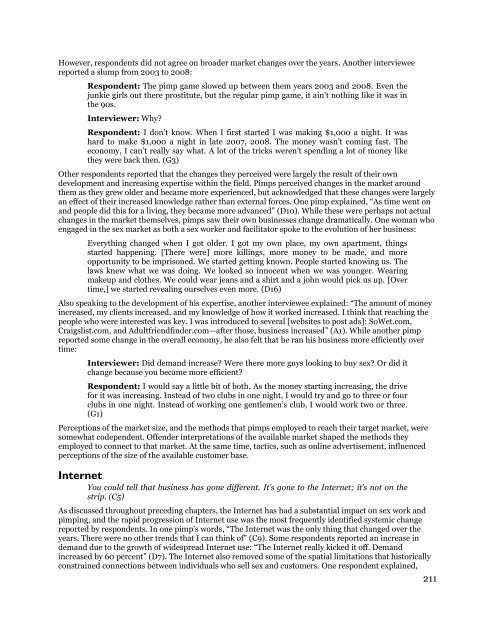413047-Underground-Commercial-Sex-Economy
413047-Underground-Commercial-Sex-Economy
413047-Underground-Commercial-Sex-Economy
Create successful ePaper yourself
Turn your PDF publications into a flip-book with our unique Google optimized e-Paper software.
However, respondents did not agree on broader market changes over the years. Another interviewee<br />
reported a slump from 2003 to 2008:<br />
Respondent: The pimp game slowed up between them years 2003 and 2008. Even the<br />
junkie girls out there prostitute, but the regular pimp game, it ain’t nothing like it was in<br />
the 90s.<br />
Interviewer: Why<br />
Respondent: I don’t know. When I first started I was making $1,000 a night. It was<br />
hard to make $1,000 a night in late 2007, 2008. The money wasn’t coming fast. The<br />
economy, I can’t really say what. A lot of the tricks weren’t spending a lot of money like<br />
they were back then. (G3)<br />
Other respondents reported that the changes they perceived were largely the result of their own<br />
development and increasing expertise within the field. Pimps perceived changes in the market around<br />
them as they grew older and became more experienced, but acknowledged that these changes were largely<br />
an effect of their increased knowledge rather than external forces. One pimp explained, “As time went on<br />
and people did this for a living, they became more advanced” (D10). While these were perhaps not actual<br />
changes in the market themselves, pimps saw their own businesses change dramatically. One woman who<br />
engaged in the sex market as both a sex worker and facilitator spoke to the evolution of her business:<br />
Everything changed when I got older. I got my own place, my own apartment, things<br />
started happening. [There were] more killings, more money to be made, and more<br />
opportunity to be imprisoned. We started getting known. People started knowing us. The<br />
laws knew what we was doing. We looked so innocent when we was younger. Wearing<br />
makeup and clothes. We could wear jeans and a shirt and a john would pick us up. [Over<br />
time,] we started revealing ourselves even more. (D16)<br />
Also speaking to the development of his expertise, another interviewee explained: “The amount of money<br />
increased, my clients increased, and my knowledge of how it worked increased. I think that reaching the<br />
people who were interested was key. I was introduced to several [websites to post ads]: SoWet.com,<br />
Craigslist.com, and Adultfriendfinder.com—after those, business increased” (A1). While another pimp<br />
reported some change in the overall economy, he also felt that he ran his business more efficiently over<br />
time:<br />
Interviewer: Did demand increase Were there more guys looking to buy sex Or did it<br />
change because you became more efficient<br />
Respondent: I would say a little bit of both. As the money starting increasing, the drive<br />
for it was increasing. Instead of two clubs in one night, I would try and go to three or four<br />
clubs in one night. Instead of working one gentlemen’s club, I would work two or three.<br />
(G1)<br />
Perceptions of the market size, and the methods that pimps employed to reach their target market, were<br />
somewhat codependent. Offender interpretations of the available market shaped the methods they<br />
employed to connect to that market. At the same time, tactics, such as online advertisement, influenced<br />
perceptions of the size of the available customer base.<br />
Internet<br />
You could tell that business has gone different. It’s gone to the Internet; it’s not on the<br />
strip. (C5)<br />
As discussed throughout preceding chapters, the Internet has had a substantial impact on sex work and<br />
pimping, and the rapid progression of Internet use was the most frequently identified systemic change<br />
reported by respondents. In one pimp’s words, “The Internet was the only thing that changed over the<br />
years. There were no other trends that I can think of” (C9). Some respondents reported an increase in<br />
demand due to the growth of widespread Internet use: “The Internet really kicked it off. Demand<br />
increased by 60 percent” (D7). The Internet also removed some of the spatial limitations that historically<br />
constrained connections between individuals who sell sex and customers. One respondent explained,<br />
211


